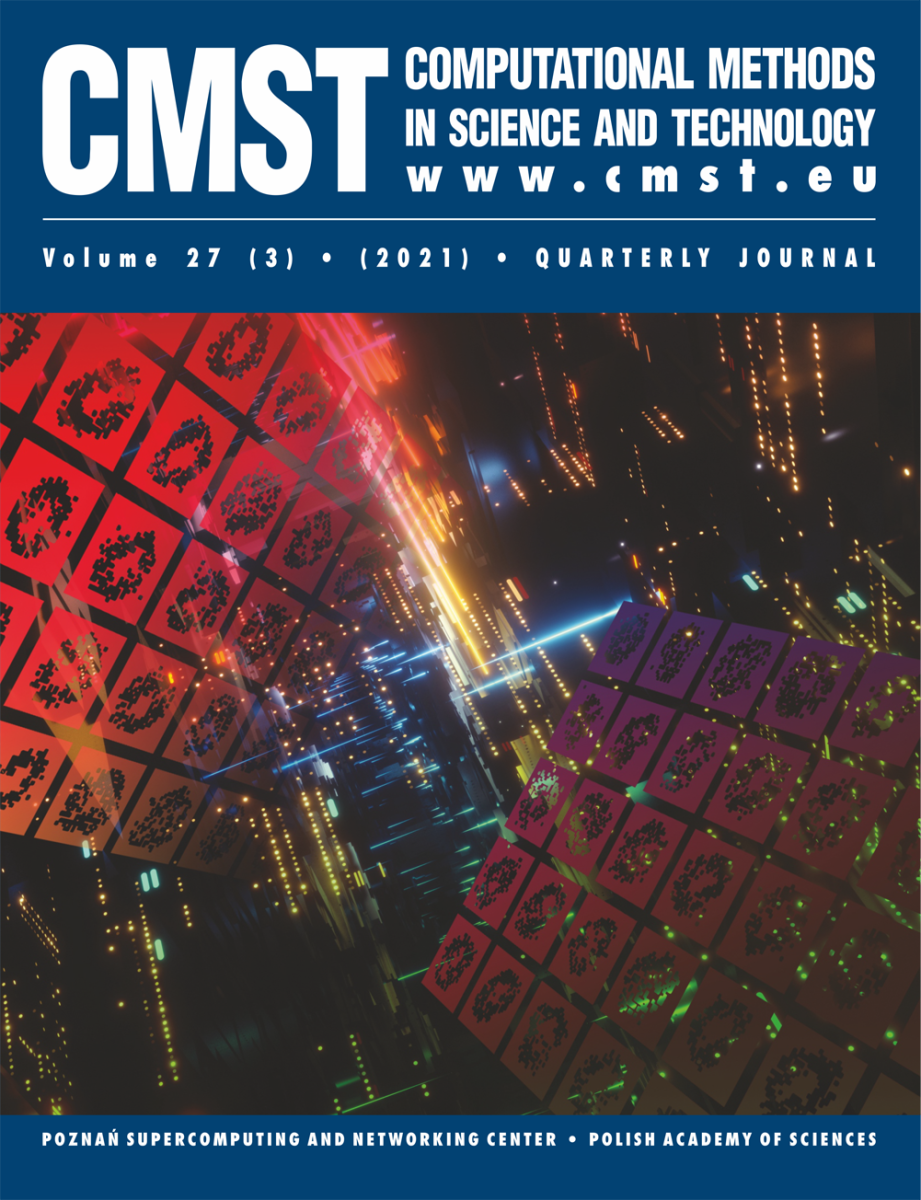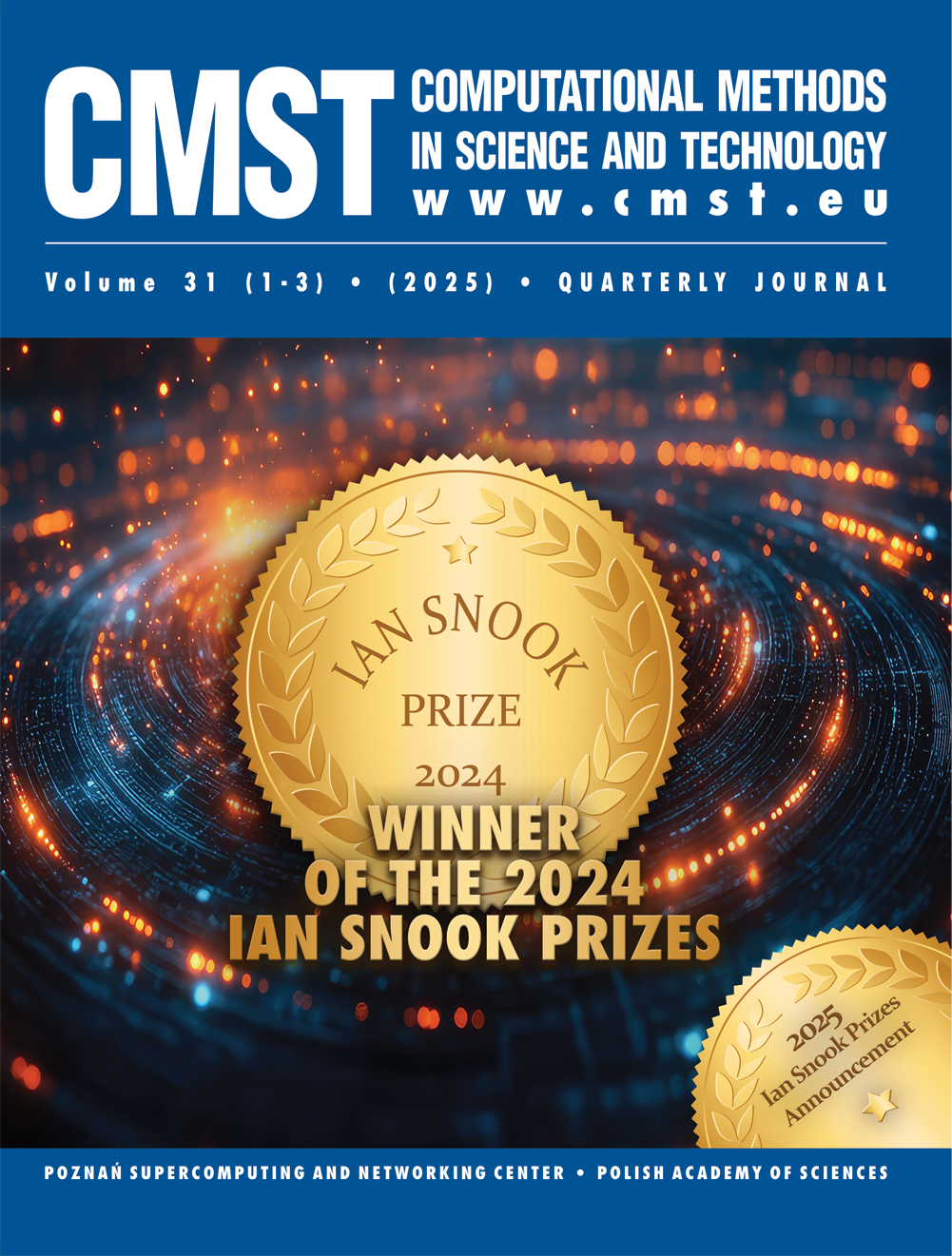Are the Stieltjes constants irrational? Some computer experiments
Maślanka Krzysztof 1, Wolf Marek 2
1 Institute for the History of Science, Polish Academy of Sciences
ul. Nowy Świat 72, 00-330 Warsaw, Poland
E-mail: krzysiek2357@gmail.com2 Cardinal Stefan Wyszynski University
Faculty of Mathematics and Natural Sciences, College of Sciences
ul. Wóycickiego 1/3, 01-938 Warsaw, Poland
E-mail: m.wolf@uksw.edu.pl
Received:
Received: 31 August 2020; revised: 19 September 2020; accepted: 22 September 2020; published online: 29 September 2020
DOI: 10.12921/cmst.2020.0000026
Abstract:
Khnichin’s theorem is a surprising and still relatively little known result. It can be used as a specific criterion for determining whether or not any given number is irrational. In this paper we apply this theorem as well as the Gauss-Kuzmin theorem to several thousand high precision (up to more than 53 000 significant digits) initial Stieltjes constants n, n = 0, 1, 2, …, 5000 in order to confirm that, as is commonly believed, they are irrational numbers (and even transcendental). We also study the normality of these important constants.
Key words:
continued fractions, experimental mathematics, Khinchin’s theorem, normality, Riemann zeta function
References:
[1] L. Euler, Variae observationes circa series infinitas, Commentarii academiae scientiarum Petropolitanae 9, 160–188 (1744).
[2] B. Riemann, Üeber die Anzahl der Primzahlen unter einer gegebenen Grösse, Monatsberichte der Königlich Preußischen Akademie der Wissenschaften zu Berlin, 671–680 (1859). English translation available at http://www.maths.tcd.ie/pub/HistMath/People/Riemann
[3] E.W. Weisstein, CRC Concise Encyclopedia of Mathematics, Chapman & Hall/CRC (2009).
[4] M. Milgram, Integral and Series Representations of Riemann’s Zeta Function and Dirichlet’s Eta Function and a Medley of Related Results, Journal of Mathematics 2013, 181724 (2013).
[5] C. Hermite, T.J. Stieltjes, Correspondance d’Hermite et de Stieltjes, Vol. 1 (1905).
[6] D.W. Sweeney, On the Computation of Euler’s Constant, Mathematics of Computation 17(82), 170 (1963).
[7] R.P. Brent, E.M. McMillan, Some New Algorithms for High-Precision Computation of Euler’s Constant, Mathematics of Computation 34(149), 305–312 (1980).
[8] J.B. Keiper, Power series expansions of Riemann’s ξ function, Mathematics of Computation 58(198), 765–765 (1992).
[9] R. Kreminski, Newton-Cotes integration for approximating Stieltjes (generalized Euler) constants, Mathematics of Computation 72(243), 1379–1397 (2002).
[10] F. Johansson, Rigorous high-precision computation of the Hurwitz zeta function and its derivatives, Numerical Algorithms 69(2), 253–270 (2014).
[11] G. Martin, The unreasonable effectualness of continued function expansions, Journal of the Australian Mathematical Society 77(3), 305–320 (2004).
[12] A.Y. Khinchin, Continued Fractions, Dover Publications, New York (1997).
[13] S.R. Finch, Mathematical Constants, Cambridge University Press (2003).
[14] R.P. Brent, Computation of the regular continued fraction for Euler’s constant, Mathematics of Computation 31(139), 771–777 (1977).
[15] C. Ryll-Nardzewski, On the ergodic theorems II (Ergodic theory of continued fractions), Studia Mathematica 12, 74–79 (1951).
[16] PARI/GP version 2.11.2, 64 bits (2019). Available at http://pari.math.u-bordeaux.fr/
[17] K. Maślanka, A hypergeometric-like Representation of Zetafunction of Riemann, Cracow Observatory preprint no. 1997/60 (1997). Posted at arXiv: math-ph/0105007 (2001). Available at http://xxx.lanl.gov/abs/math/0105007
Khnichin’s theorem is a surprising and still relatively little known result. It can be used as a specific criterion for determining whether or not any given number is irrational. In this paper we apply this theorem as well as the Gauss-Kuzmin theorem to several thousand high precision (up to more than 53 000 significant digits) initial Stieltjes constants n, n = 0, 1, 2, …, 5000 in order to confirm that, as is commonly believed, they are irrational numbers (and even transcendental). We also study the normality of these important constants.
Key words:
continued fractions, experimental mathematics, Khinchin’s theorem, normality, Riemann zeta function
References:
[1] L. Euler, Variae observationes circa series infinitas, Commentarii academiae scientiarum Petropolitanae 9, 160–188 (1744).
[2] B. Riemann, Üeber die Anzahl der Primzahlen unter einer gegebenen Grösse, Monatsberichte der Königlich Preußischen Akademie der Wissenschaften zu Berlin, 671–680 (1859). English translation available at http://www.maths.tcd.ie/pub/HistMath/People/Riemann
[3] E.W. Weisstein, CRC Concise Encyclopedia of Mathematics, Chapman & Hall/CRC (2009).
[4] M. Milgram, Integral and Series Representations of Riemann’s Zeta Function and Dirichlet’s Eta Function and a Medley of Related Results, Journal of Mathematics 2013, 181724 (2013).
[5] C. Hermite, T.J. Stieltjes, Correspondance d’Hermite et de Stieltjes, Vol. 1 (1905).
[6] D.W. Sweeney, On the Computation of Euler’s Constant, Mathematics of Computation 17(82), 170 (1963).
[7] R.P. Brent, E.M. McMillan, Some New Algorithms for High-Precision Computation of Euler’s Constant, Mathematics of Computation 34(149), 305–312 (1980).
[8] J.B. Keiper, Power series expansions of Riemann’s ξ function, Mathematics of Computation 58(198), 765–765 (1992).
[9] R. Kreminski, Newton-Cotes integration for approximating Stieltjes (generalized Euler) constants, Mathematics of Computation 72(243), 1379–1397 (2002).
[10] F. Johansson, Rigorous high-precision computation of the Hurwitz zeta function and its derivatives, Numerical Algorithms 69(2), 253–270 (2014).
[11] G. Martin, The unreasonable effectualness of continued function expansions, Journal of the Australian Mathematical Society 77(3), 305–320 (2004).
[12] A.Y. Khinchin, Continued Fractions, Dover Publications, New York (1997).
[13] S.R. Finch, Mathematical Constants, Cambridge University Press (2003).
[14] R.P. Brent, Computation of the regular continued fraction for Euler’s constant, Mathematics of Computation 31(139), 771–777 (1977).
[15] C. Ryll-Nardzewski, On the ergodic theorems II (Ergodic theory of continued fractions), Studia Mathematica 12, 74–79 (1951).
[16] PARI/GP version 2.11.2, 64 bits (2019). Available at http://pari.math.u-bordeaux.fr/
[17] K. Maślanka, A hypergeometric-like Representation of Zetafunction of Riemann, Cracow Observatory preprint no. 1997/60 (1997). Posted at arXiv: math-ph/0105007 (2001). Available at http://xxx.lanl.gov/abs/math/0105007

